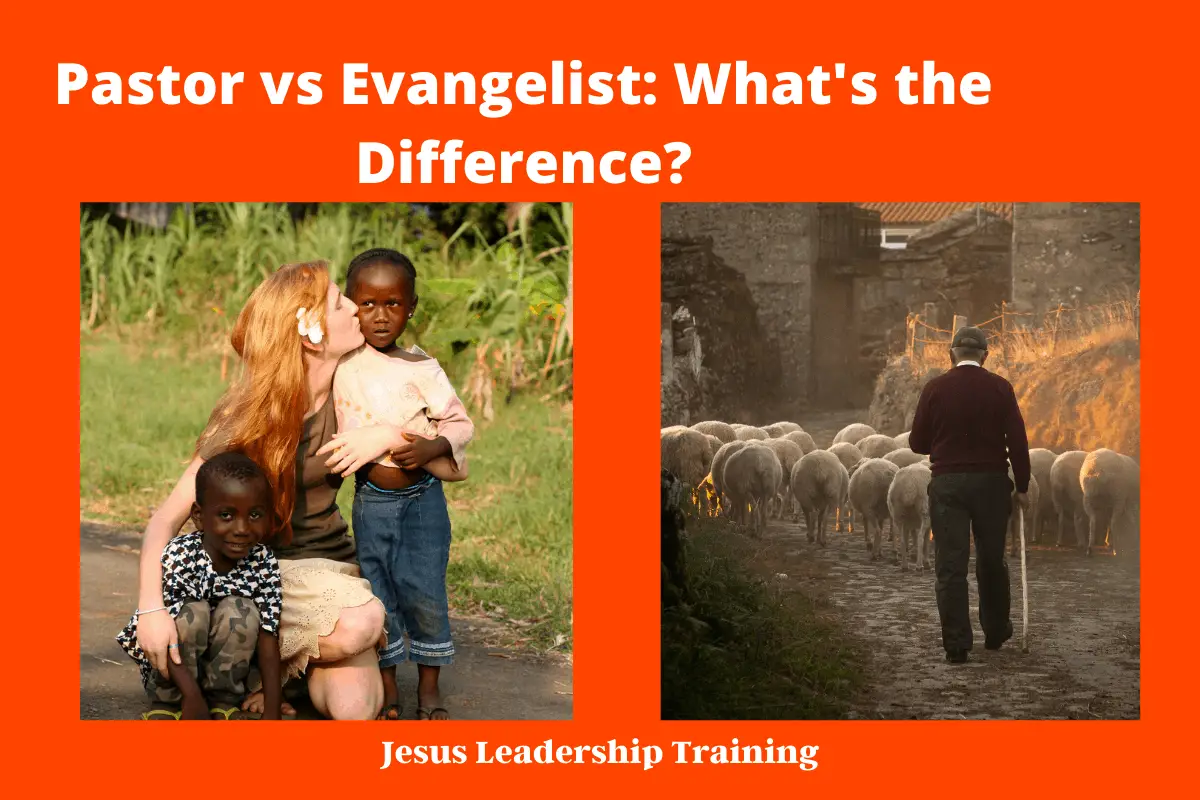The main difference between a pastor and a Evangelist
- Pastor vs Evangelist
- Evangelist – His Spiritual Gift is in His Passion to Lead People to Christ
- Evangelist – Tends to Travel – Go where the Spirit Leads
- Evangelist – Parallel a heart of Missionary
- Evangelist – take the Gospel to those who do not have it (good news)
- Pastor – Shepherds a Local Congregation
- Pastor – Remains in one location
- Pastor – Feeds God’s Flock
- Pastor – Protects the local Flock
- Pastor – Helps take Young Christians, newborns until they mature to spiritual adults. – He is responsible for His Flocks Spiritual Growth
Table of Contents
What is a Pastor: 10 Differences Between Evangelist
So Christ himself gave the apostles, the prophets, the evangelists, the pastors, and teachers, to equip his people for works of service, so that the body of Christ may be built up. “jesus christ”
Ephesians 4:11-12 (NIV)
What is the difference between a pastor and an evangelist? To understand this better, we need to know that evangelists and pastors are people with spiritual gifts of evangelism and pastor/shepherd, respectively. These two gifts belong to the five-fold ministry found in Ephesians 4:11. Like other spiritual gifts, people with these gifts use them to edify the body of Christ.
When a believer gives their life to Christ, they are given spiritual gifts by God through his Holy Spirit. These gifts are given to us according to the will of the Holy Spirit, so we cannot choose which gift we want in our lives. But we can pray and ask God to impart them to us through his spirit.
Understand that although the gifts of pastor and evangelism are under ministration gifts, they are not the same. Here is why:
What is Vision Casting – Proverbs 29:18 says, “Where there is no vision, the people perish
Check this vision – I would follow this – Greg Gaines
Evangelists bring souls to the Church / Pastor vs Evangelist
The Gifts of Evangelism – takes the Evangelist wherever the Lord Leads him. Whether it is a chariot on its way to Ethiopia or the suburb of Chicago. Their Hearts and Gifts are in Harvesting souls for Christ’s Kingdom
All Christians are called to evangelize, but all of us do not have the spiritual gift of evangelism. Evangelists have been given an extra measure of faith and grace to preach the gospel to the lost souls and lead them to Christ. They also have the special grace of preaching the word of God clearly and effectively to unbelievers. Sharing the Good News.
Evangelists are open to communicating with different kinds of people to lead them to salvation (good news) with the help of the Holy Spirit. They continually seek out relationships with people who do not know Christ so that they can preach the gospel to them.

On the other hand, evangelists are called to go into the world. They have to go to different parts of the world as per the leading of the Holy Spirit to preach the word of God.
Since an evangelist is always on the move, it is hard for them to lead a local church like a pastor. The main role of evangelists in the body of Christ is to preach the gospel ( good news) and bring people to the church. That is to say, while evangelists plant the seed that is the word of God in the hearts of unbelievers and lead them into salvation, it is the pastors that water and cultivate that word by ensuring that the people who have surrendered their lives to Christ continue to grow spiritually.
here is a table that outlines some of the primary differences between a Pastor and an Evangelist based on biblical definitions and modern interpretations:
| Role | Primary Duties | Focus | Biblical Basis |
|---|---|---|---|
| Pastor | Provides spiritual guidance and care to a specific congregation, preaches sermons, conducts services, provides counseling, and leads church activities. | The spiritual growth and well-being of their local congregation. | Ephesians 4:11-12; 1 Peter 5:1-4 |
| Evangelist | Shares the Gospel with non-believers, often traveling to different locations to preach and sometimes starting new churches. | Outreach to those who are not already part of a Christian community, often with a focus on conversion. | Ephesians 4:11-12; 2 Timothy 4:5 |
Remember, the definitions and roles of these terms can vary depending on denominations and interpretations, and many pastors and evangelists may perform duties that overlap with each other. Some pastors may do evangelistic work, and some evangelists may serve pastoral roles.
It is worth noting that evangelists can work in different cities, but a pastor is called to lead a local church within the community.
Pastors are responsible for the Spiritual Growth of the Church
Pastors are called by God to take care of the spiritual growth of the body of Christ. They use their gift to build up the body of Christ by preaching and teaching people about God and helping them to continue growing in their faith. They are also known as shepherds because God has given them the mandate to take care of his children, just like the shepherd takes care of his sheep.
Don’t Water Weeds
These Servants have the Heart and caring for God’s Children in a specific location, to an individual flock of Sheep
Leading the Church
God has granted pastors special abilities of leadership so that they can be able to lead the body of Christ in communities where they live. So, a pastor’s job is not limited to preaching the word of God. They need to be leaders in their church
(Acts 20:28). “Keep watch over yourselves and all the flock of which the Holy Spirit has made you overseers. Be shepherds of the church of God, which he bought with his own blood.”
Pastors can evangelize, but not all evangelists should be pastors
As we have already seen, every believer has been given the mandate to go into the world and preach the gospel (good news)
(Mark 16:15 – 18). “He said to them, “Go into all the world and preach the gospel to all creation. 16 Whoever believes and is baptized will be saved, but whoever does not believe will be condemned. 17 And these signs will accompany those who believe: In my name, they will drive out demons; they will speak in new tongues; 18 they will pick up snakes with their hands; and when they drink deadly poison, it will not hurt them at all; they will place their hands on sick people, and they will get well.”
It means that all pastors can and should evangelize. They need to preach the message of the cross to people who do not know Jesus in their communities. And those who come to church but have not given their lives to jesus christ to the point of salvation. But at the same time, guide and direct their congregation on spiritual and life matters.
It is a big challenge for an evangelist to take up both the roles of evangelism and being a pastor. They are supposed to focus on planting seeds (spreading the gospel), so not all evangelists can be pastors.
Traveling
We have different kinds of pastors today. So to be clear, we are talking about the main pastor of the church in this article. The one that is in charge of a particular church according to scripture.
A pastor needs to take care of the issues that come up in the church. They need to be there for their congregants. So they are limited to how far they can travel, that is to say, a pastor cannot leave his church for five years to travel to different parts of the world to spread the gospel.
An evangelist, on the other hand, can travel to different parts of the world because they are required to spread the gospel to the world. In business terms, an evangelist can be equated to a sales manager. They need to take the gospel to people that are outside the body of Christ. While a pastor is an operational manager, they need to ensure that the people coming to church are growing spiritually.
To sum it up
Pastors and evangelists are gifted differently. While they can both evangelize, evangelists have been given a special grace by God to go into the world and preach the good news of the kingdom of God. Pastors, on the other hand, have a special calling to take care of God’s flock that is the body of Christ. They are responsible for the spiritual growth of members of their local church.
Evangelists go to different parts of the world mostly as missionaries to spread the gospel of Christ and to bring lost souls to the church. Evangelists plant seeds (the word of God) in the hearts of those that are lost and lead them to Christ through the leading of the Holy Spirit. Pastors, on the other hand, are mainly responsible for ensuring that the people who give their lives to Jesus continue growing spiritually. They are responsible for preaching and teaching people in the body of Christ the word of God so that they can continue walking in the purposes of God.

Evangelist vs Pastor: Understanding the Differences and Similarities
In the world of Christianity, there are different positions of leadership that serve the church and its members. Two such positions are evangelist and pastor. Both of these positions are vital to the growth and well-being of a church community, but they have distinct differences. In this article, we will explore the similarities and differences between evangelist vs pastor.
The Roles of Evangelists and Pastors
The Role of Evangelists
An evangelist is a person who is committed to spreading the Gospel to people who have not yet accepted Christ as their Savior. Their primary focus is on evangelism, which involves sharing the good news of Jesus Christ with others. Evangelists are also responsible for planning and conducting evangelistic events and discipleship, which involves teaching and mentoring new believers.
The Role of Pastors
A pastor is responsible for providing spiritual guidance to a church community. They are responsible for preaching and teaching, providing pastoral care, and overseeing the day-to-day operations of the church. Pastors also help to mentor and disciple new believers, but their focus is on providing ongoing support and guidance to the church community.
The Qualifications of Evangelists and Pastors
Qualifications for Evangelists
According to the Bible, there are certain qualifications for those who serve as evangelists. These include having a deep knowledge and understanding of the Gospel message, being passionate about sharing that message with others, and having the ability to effectively communicate with people from all walks of life. Additionally, evangelists should be able to teach and mentor new believers, and they should have a heart for discipleship.
Qualifications for Pastors
Like evangelists, pastors are also held to certain qualifications. According to the Bible, pastors should have a deep knowledge and understanding of the Word of God, be able to teach and disciple others, and have a heart for pastoral care. Additionally, pastors should be able to lead by example and demonstrate a high level of moral character.
The Differences Between Evangelists and Pastors
Focus on Evangelism
One of the primary differences between evangelists and pastors is their focus. Evangelists are primarily focused on spreading the Gospel and reaching people who have not yet accepted Christ as their Savior. Pastors, on the other hand, are focused on providing ongoing support and guidance to the church community.
Responsibilities and Authority
Another difference between evangelists and pastors is their responsibilities and authority within the church. Evangelists are usually not part of the church staff and do not have the same level of authority as pastors. They are often invited to speak at churches and events, but their role is limited to evangelism and discipleship.
Pastors, on the other hand, are usually part of the churchstaff and have a more significant level of authority within the church. They are responsible for overseeing the day-to-day operations of the church, providing pastoral care, and leading the church community.
Educational Requirements
Another difference between evangelists and pastors is their educational requirements. While there are no formal educational requirements for either position, pastors are often required to have a degree from a seminary or Bible college. Evangelists, on the other hand, may have a degree in theology or ministry, but it is not a requirement for the position.
The Similarities Between Evangelists and Pastors
Passion for God and People
Despite their differences, both evangelists and pastors share a passion for God and people. They are committed to spreading the Gospel message and helping others grow in their faith. They are driven by a desire to serve God and share His love with others.
Love for God’s Word
Both evangelists and pastors also share a love for God’s Word. They recognize the importance of studying the Bible and applying its teachings to their lives. They are committed to teaching and preaching the Word of God with clarity and conviction.
Importance of Prayer
Finally, both evangelists and pastors understand the importance of prayer. They recognize that prayer is an essential part of their relationship with God and that it is a powerful tool for spiritual growth and transformation. They encourage others to pray and seek God’s guidance in all areas of their lives.
In conclusion, evangelists and pastors both serve important roles in the church community. While they have distinct differences in their focus, responsibilities, and qualifications, they share a common passion for God and people. They are committed to spreading the Gospel message and helping others grow in their faith. By working together, evangelists and pastors can make a significant impact on the world for Christ.
Difference Between Apostle and Pastor
If you’ve ever wondered about the difference between an Apostle and a Pastor, you’re definitely not alone. These are terms we often hear in Christian circles, but they serve distinct roles within the church. To help you understand the differences, let’s break it down in a super friendly table! 😊📖👇
| Criteria | Apostle | Pastor | What’s the Deal? |
|---|---|---|---|
| Biblical Origin | New Testament (e.g., the Twelve Apostles) | New Testament (e.g., Ephesians 4:11) | Both roles have New Testament origins but appear in different contexts. |
| Primary Role | Foundation-laying, Church-planting | Shepherding a local congregation | Apostles focus on spreading Christianity and establishing new churches, while Pastors tend to the needs of an established local church. |
| Scope | Often broader, multiple churches | Usually local, one church | Apostles often have a wider scope, affecting multiple congregations or even regions, whereas Pastors focus on their local church. |
| Authority | Higher authority, often over multiple church leaders | Under the authority of church governance or an Apostle | Apostles often have a broader level of authority, which may extend over multiple Pastors or churches. |
| Spiritual Gifts | Apostleship, leadership, miracles, prophecy | Shepherding, teaching, encouragement | Apostles often have the gift of performing miracles and prophecy, while Pastors excel in caring for their flock and teaching. |
| Timeframe | Usually temporary for foundation-laying | Often long-term in one community | The role of an Apostle is often for a specific mission or period, while Pastors often serve long-term in one community. |
| Examples | Paul, Peter, John | Timothy, local church leaders | Apostles are often people who were foundational to the Christian church, while Pastors can be any qualified leaders of a local congregation. |
I hope this table clears things up a bit! While both Apostles and Pastors play crucial roles in building and maintaining the Christian community, their functions, scope, and responsibilities vary. Whether you’re interested in church history, theology, or simply curious, understanding these differences can provide valuable insights! 😊🌟
FAQs
What is the primary role of an evangelist?
An evangelist’s primary role is to spread the Gospel message and reach people who have not yet accepted Christ as their Savior.
What is the primary role of a pastor?
A pastor’s primary role is to provide spiritual guidance and support to a church community. They are responsible for preaching and teaching, providing pastoral care, and overseeing the day-to-day operations of the church.
Are there any educational requirements for evangelists or pastors?
While there are no formal educational requirements for either position, pastors are often required to have a degree from a seminary or Bible college.
What is the most significant difference between evangelists and pastors?
The most significant difference between evangelists and pastors is their focus. Evangelists are primarily focused on evangelism, while pastors are focused on providing ongoing support and guidance to the church community.
Can an evangelist also serve as a pastor?
While it is possible for an evangelist to serve as a pastor, it is not common. Evangelists and pastors have different qualifications and responsibilities, and the two positions require different skill sets.





